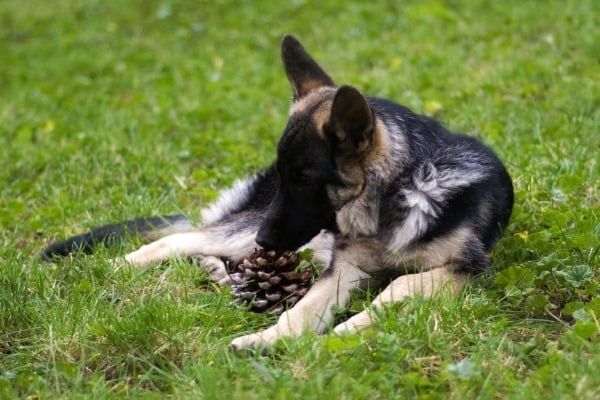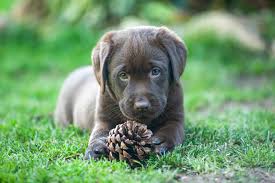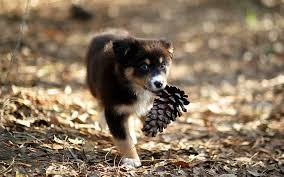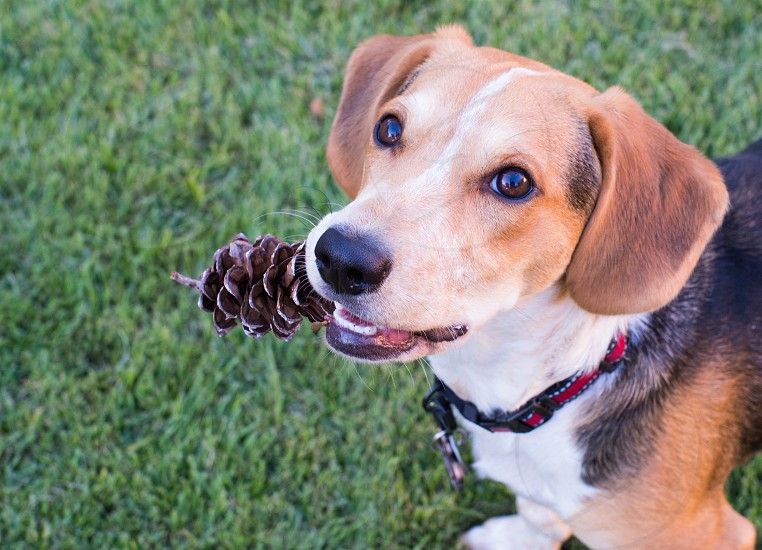What To Do If Your Dog Eats A Pine Cone? (6 Ways To Stop It)
What To Do If Your Dog Eats A Pine Cone? (6 Ways To Stop It)

Vet Reviewed

By: Sarah Hodgson
December 21, 2023
Table of Contents
Dogs are adorable but interesting, to say the least. They like to taste anything and pine cones are no exception. While it may seem harmless at first, there are risks associated with it.
In this article, we will explore what pine cones are, why dogs eat them, the dangers associated with them, and most importantly, what you should do if your dog eats a pine cone.
So let's dive in!
What Are Pine Cones?
Firstly, what exactly are pine cones?
Pine cones are a type of reproductive structure found on certain types of trees. These cone-shaped structures contain seeds and play an important role in the tree's reproduction. Pine cones can vary in size depending on the species of tree, but they are typically brown or green in color.
In addition to that they are woody, and their scales can open and close to protect the seeds within. The seeds are released when the cone dries out or is exposed to heat, allowing them to fall to the ground and potentially grow into new trees. People often see pine cones on the ground or in trees, especially in pine forests.
Why Do Dogs Eat Pine Cones?
As all of us dog owners know, dogs have a natural instinct to explore and chew on everything.
Pine cones, with their intriguing texture and smell, can be quite appealing to dogs and are no exception to their curiosity. Whether it's the motion of the pine cone falling from a tree or the taste of sap or debris stuck to it. Dogs are curious and want to check it out. So when you combine their curiosity with their two favorite scenes smell and taste you get a dog trying to eat a pine cone.
Is It Dangerous For Dogs To Eat Pine Cones?
To say it shortly, Yes pine cones are dangerous to dogs. Though not always toxic they are dangerous. The potential dangers associated with them include:
- Choking Hazard: Pine cones can be a choking hazard, especially if they are of a size that can get lodged in a dog's throat.
- Digestive Blockages: Swallowing pine cones can lead to digestive blockages, causing discomfort, vomiting, and potentially requiring surgery.
- Splinters and Injuries: Pine cones are hard and can splinter, posing a risk of mouth and gastrointestinal injuries.
- Toxic Substances: Some pine trees may produce substances that are toxic to dogs, and ingestion of pine cones may expose them to these harmful compounds.
- Gastrointestinal Irritation: Even if not toxic, the rough texture of pine cones can cause irritation to the dog's digestive tract.
- Obstruction of Airway: Small parts of pine cones may break off and obstruct a dog's airway, leading to breathing difficulties.

Signs That Your Dog Has Eaten a Pine Cone
If you suspect that your dog has eaten a pine cone, it's important to be aware of the signs that may indicate a problem.
Some of the potential signs include:
- Vomiting: Persistent vomiting, especially if it contains fragments of pine cone or other foreign material.
- Lethargy: Unusual tiredness or a lack of energy that is not typical for your dog.
- Loss of Appetite: Refusing to eat or a sudden decrease in interest in food.
- Abdominal Pain: Signs of discomfort or pain in the abdominal area, which may manifest as whining, restlessness, or a hunched posture.
- Changes in Bowel Movements: Diarrhea or constipation may be indicators of gastrointestinal distress.
- Difficulty Defecating: Straining or difficulty during bowel movements, which could be a sign of an obstruction.
- Behavioral Changes: Unusual behavior such as increased agitation, anxiety, or reluctance to be touched.
- Coughing or Gagging: These could be signs of airway obstruction or irritation.
- Visible Pine Cone Parts: If you see pieces of pine cone in the dog's vomit or feces, it's a clear indication of ingestion.
If you notice any of these signs, it's important to take action and help your dog.
What Should I Do If My Dog Ate a Pine Cone?
So now to the question you came here for, what should you do?
If you discover that your dog has eaten a pine cone, there are several immediate steps you should take.
Try to assess the situation and determine if your dog is showing any signs of distress or discomfort. If your dog seems fine and is not exhibiting any symptoms, you can monitor them closely for the next 24 hours. Ensure they have access to plenty of fresh water to help with digestion.
Observe your dog and make sure they aren't showing any of the signs we mentioned above if they are it's best to call your vet right away. They may induce vomiting or run some tests. However, it's important for you to stay calm as your dog will most likely be alright.

6 Ways To Stop Your Dog From Eating Pine Cones
Now if your dog has a thing for tasting these woody creations there are ways you can stop it and prevent your dog from eating more.
Training Commands
One effective way to prevent your dog from eating pine cones is through training commands. Teach your dog the "leave it" or "drop it" command, which can be useful in situations where they have something in their mouth that they shouldn't. Consistent training and positive reinforcement will help your dog understand what is expected of them.
Use a Leash
Using a leash when walking your dog can give you better control over their movements and prevent them from reaching pine cones. Keep a close eye on your dog during walks, especially in areas where pine cones are prevalent. If your dog attempts to pick up a pine cone, gently redirect their attention and reward them for following your command.
Clear the Yard
If you have pine trees in your yard, it's essential to regularly clear away fallen pine cones. Raking or sweeping the area can help eliminate temptations for your dog. Additionally, consider using barriers or fencing to restrict your dog's access to areas where pine cones are abundant.
Bitter Sprays or Repellents
Bitter sprays or repellents can be applied to pine cones to make them unappealing to dogs. These products have a bitter taste that dogs dislike, discouraging them from chewing or eating the cones. Consult with your veterinarian to find a safe and effective bitter spray suitable for your dog.
Create a Distaste for Pine Cones
You can also try creating a negative association between your dog and pine cones. Whenever your dog shows interest in a pine cone, use a firm and commanding voice to say "no" and redirect their attention to a more appropriate toy or activity. Over time, your dog will learn that pine cones are off-limits.
Use Positive Reinforcement
Positive reinforcement is crucial when training your dog to avoid pine cones. Whenever your dog ignores or leaves a pine cone alone, reward them with praise, treats, or their favorite toy. This positive reinforcement will reinforce their good behavior and strengthen the bond between you and your furry companion.

When Should I Consult My Vet?
While most cases of dogs eating pine cones can be managed at home, there are instances where veterinary intervention is a must.
For instance, if your dog is showing severe symptoms such as persistent vomiting, severe abdominal pain, or difficulty breathing, it's crucial to seek immediate veterinary care. Additionally, if your dog has ingested a large or sharp piece of a pine cone, it's best to consult your veterinarian for guidance.
The Bottom Line
So there you have it, while a dog eating a pine cone may seem harmless, it's important to be aware of the potential risks and take action if you suspect your dog has. By following the six ways mentioned in this article, you can prevent your dog from eating pine cones and ensure their safety and well-being.
Frequently Asked Questions
Should I induce vomiting at home?
It's important to talk with your veterinarian before attempting to induce vomiting at home. Inducing vomiting may not be appropriate in every case, and your vet can provide guidance based on the specific needs.
What will the veterinarian do?
Your veterinarian may recommend bringing your dog in for an examination. They might conduct X-rays or other imaging to assess the location and size of the pine cone in the digestive tract. Depending on the severity, they may induce vomiting in a controlled environment or consider other interventions such as surgery.
How can I prevent this in the future?
To prevent your dog from eating pine cones in the future, supervise them closely during outdoor activities and consider restricting access to areas where pine cones are present. Training your dog to leave unfamiliar objects alone can also be beneficial. If your dog has a tendency to explore with their mouth, consider using a muzzle or a leash during walks.

Subscribe to Petfluence!
Get updates on the latest posts and more from Petfluence straight to your inbox.